This website uses cookies
We use cookies to ensure that we give you the best experience on our website. If you continue to use this site we will assume that you are happy with it.
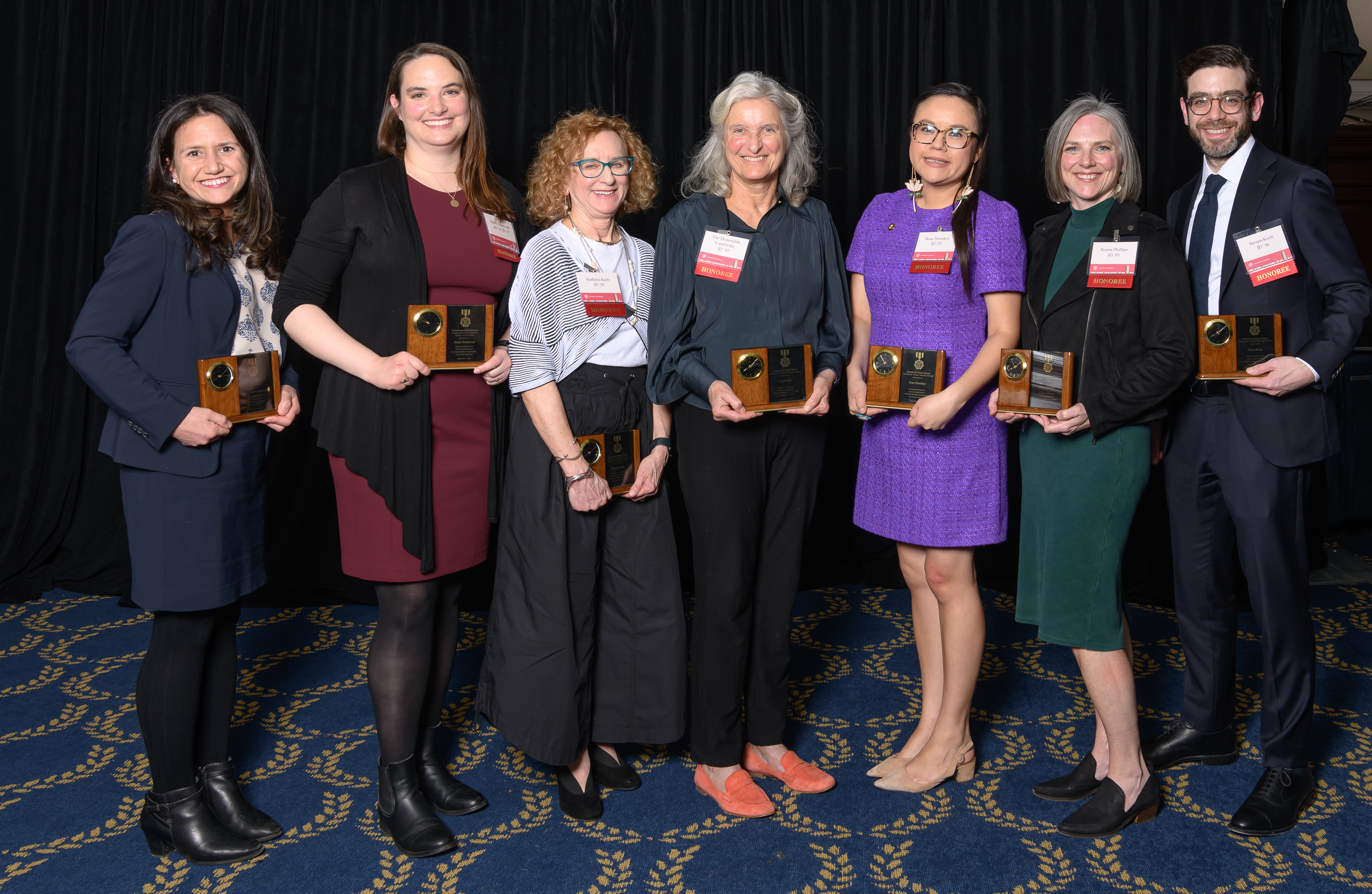
Alumni and Students Honored for Public Service Achievements
Cornell Law School alumni, students, professors, and staff gathered on March 21 to celebrate outstanding contributions to the public interest, at the 19th Annual Exemplary Public Service Awards ceremony. Hosted by Michaela Azemi, the Law School’s director of public interest and community engagement, at the New York City Bar Association, the ceremony also saw the inaugural presentation of the Barry Strom Excellence in Clinical Teaching Award.
“Our legal system literally cannot function unless there is meaningful access to legal services for all,” said Jens Ohlin, the Allan R. Tessler Dean and Professor of Law. “To fulfill law schools’ academic and community service missions as providers of pro bono service and as purveyors of civic discourse and debate, we must remain uniformly intellectually superb, as can only occur if we recruit and educate for excellence.”
Six alumni were honored with the 2024 Public Service Awards. Vivian Hernandez ’12 is a capital defense counsel at the Military Commissions Defense Organization who is currently defending a detainee held at Guantanamo Bay. Steven Koch ’16 is a counsel at the New York State Senate and advocates for housing nondiscrimination. John Mills ’08, a founder and principal attorney of Phillips Black, has an extensive record representing people sentenced to death or juvenile life without the possibility of parole. Carol Ode ’82, a Vermont state representative, successfully championed a law banning child marriage in her state. Rose Petoskey ’15, a member of the Grand Traverse Band of Ottawa and Chippewa Indians, is the Biden administration’s senior advisor and director of tribal affairs, where she is a strong voice for tribes’ self-determination and sovereignty. Karen Phillips ’05 fights for racial equity and social justice as an assistant managing attorney at the Northwest Justice Project, a Washington State legal aid organization.
The Rising Star Awards went to Sarah Estabrook ’17, a supervisory asylum officer at U.S. Citizenship and Immigration Services and a leader in the Public Sector Alumni Network; Nathalie Greenfield ’21, a capital defender at Phillips Black who has represented clients around the world and has published research on women on death row; and Cristina Quiñones-Betancourt ’14, who represents tenants resisting gentrification, displacement, and structural racism in New York City as the director of fair housing at the Communities Resist legal aid nonprofit.
Andowah Newton ’06, who received one of the Pro Bono Awards, recounted her experience of sexual harassment and assault while working at LVMH Moët Hennessy Louis Vuitton as vice president of legal affairs, and how the company dismissed her concerns and ultimately fired her. She initially struggled with the decision of whether to seek accountability. However, Newton kept going, ultimately testifying before Congress to help pass a law abolishing forced arbitration for sexual assault and harassment victims and attending the bill signing at the White House.
“Despite my fears, I was in a position to demand change,” Newton said. “And I’ve learned that even the smallest acts of courage can have unforeseen yet powerful consequences and ripple effects on our entire system.”
The other Pro Bono Award recipient, Samantha Singh ’19, is an associate at Debevoise & Plimpton who logged more than 700 hours of pro bono work last year and is on track to exceed that in 2024. In her acceptance, Singh mentioned that just two weeks earlier, a judge had finally reduced a disproportionate and “bone-crushing” sentence being served by one of her clients to time served and released him from prison after twenty-one years.
Professor Emeritus Barry Strom, who anchored the Cornell Legal Aid Clinic over a three-and-a-half-decade Law School career, presented his namesake award—which he promptly dubbed “the Barry”—to Barbara Babb ’81. Babb, a professor emerita at the University of Baltimore School of Law, is a family law pioneer who has pushed court systems across the nation to consider children and families’ particular needs. Recruited from a legal aid career, Babb helped revamp the school’s clinical program and founded the Sayra and Neil Meyerhoff Center for Families, Children, and the Courts, which, she said, “advocates for reforms to the family justice system nationwide so the system really acts in a way that focuses on actually helping the families and children who enter the court system.”
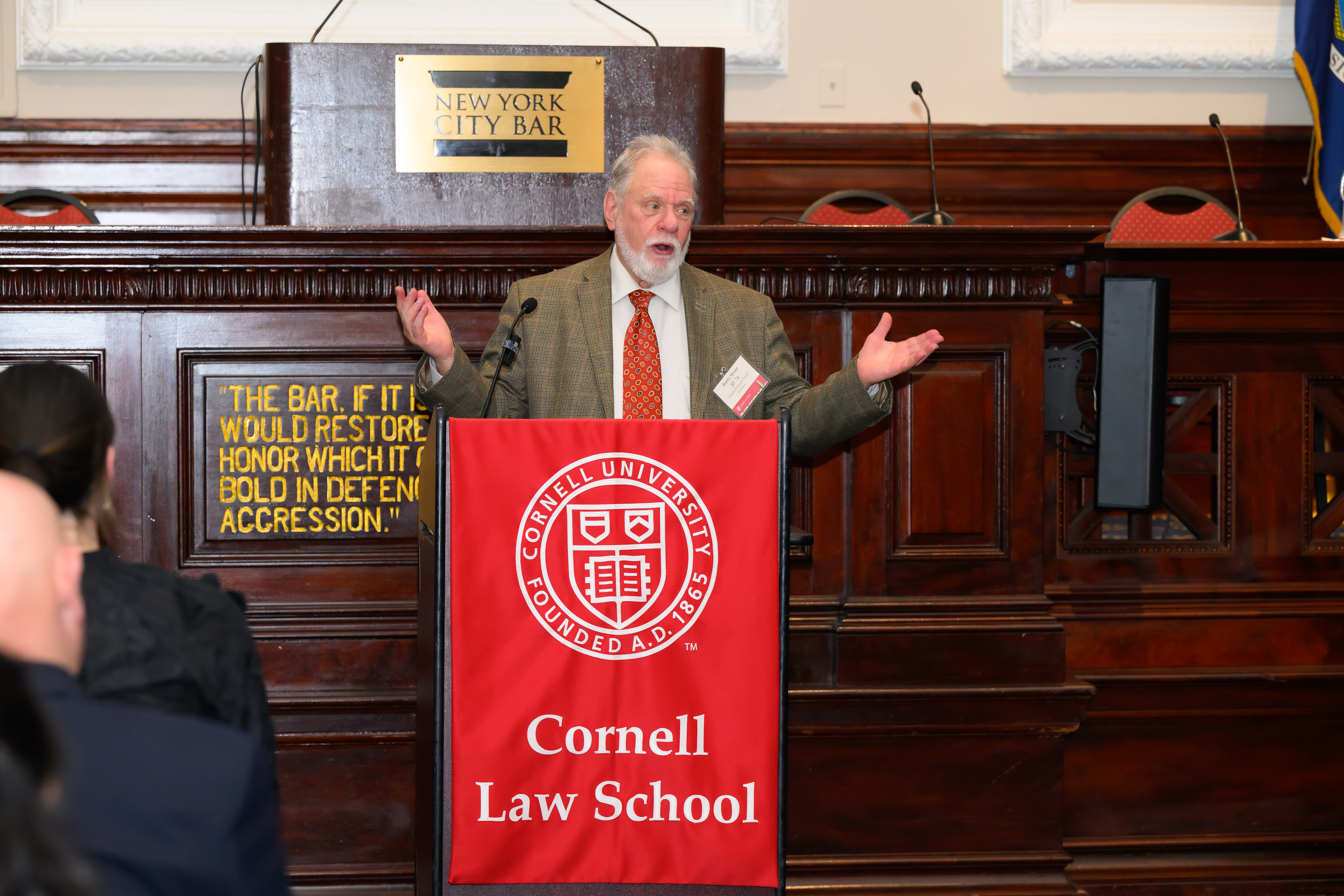
Professor Emeritus Barry Strom, who led the Cornell Legal Aid Clinic over a three-and-a-half-decade Law School career, presented the inaugural Barry Strom Excellence in Clinical Teaching Award.
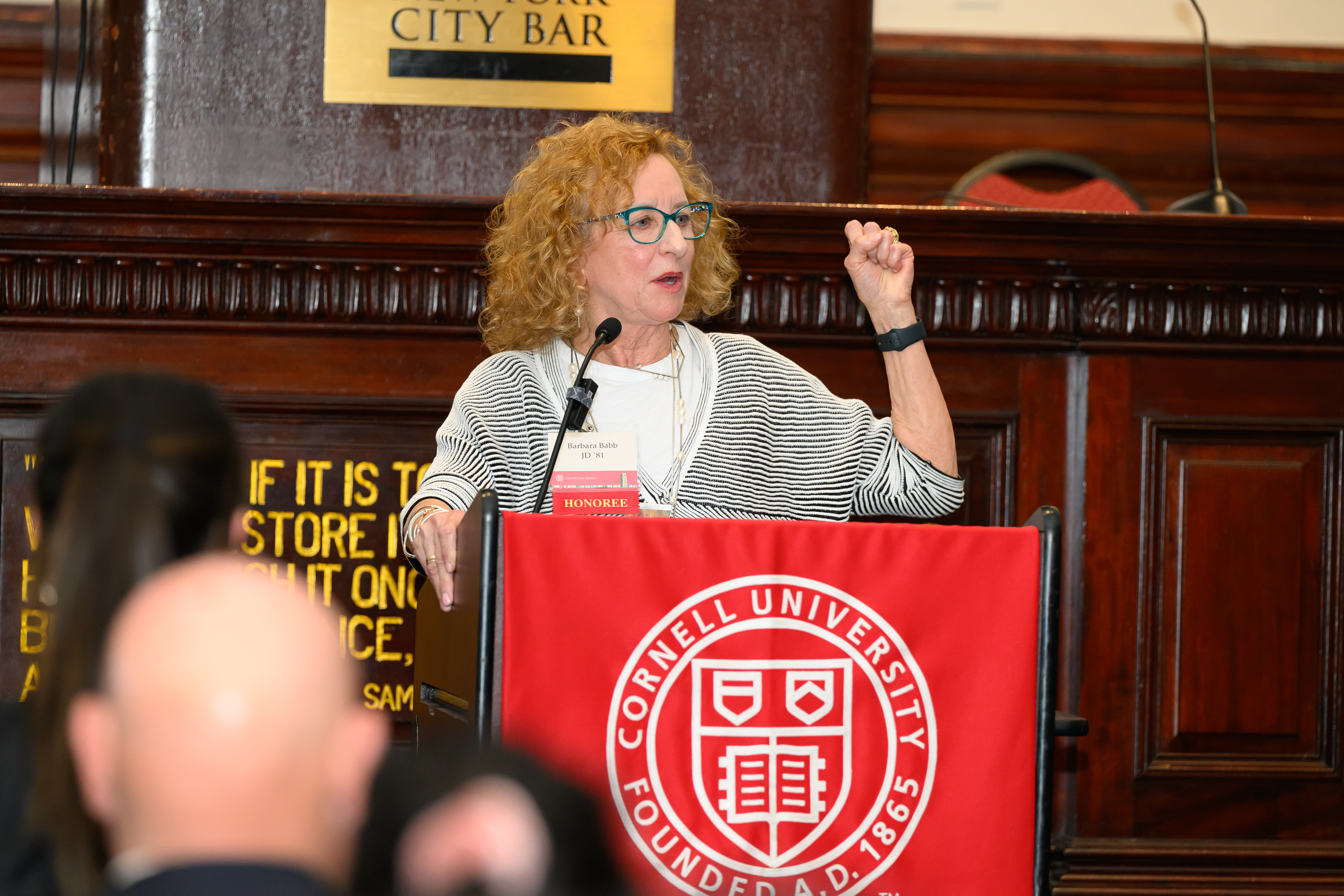
Barbara Babb ’81, a professor emerita at the University of Baltimore School of Law, speaks after receiving the inaugural Barry Strom Excellence in Clinical Teaching Award
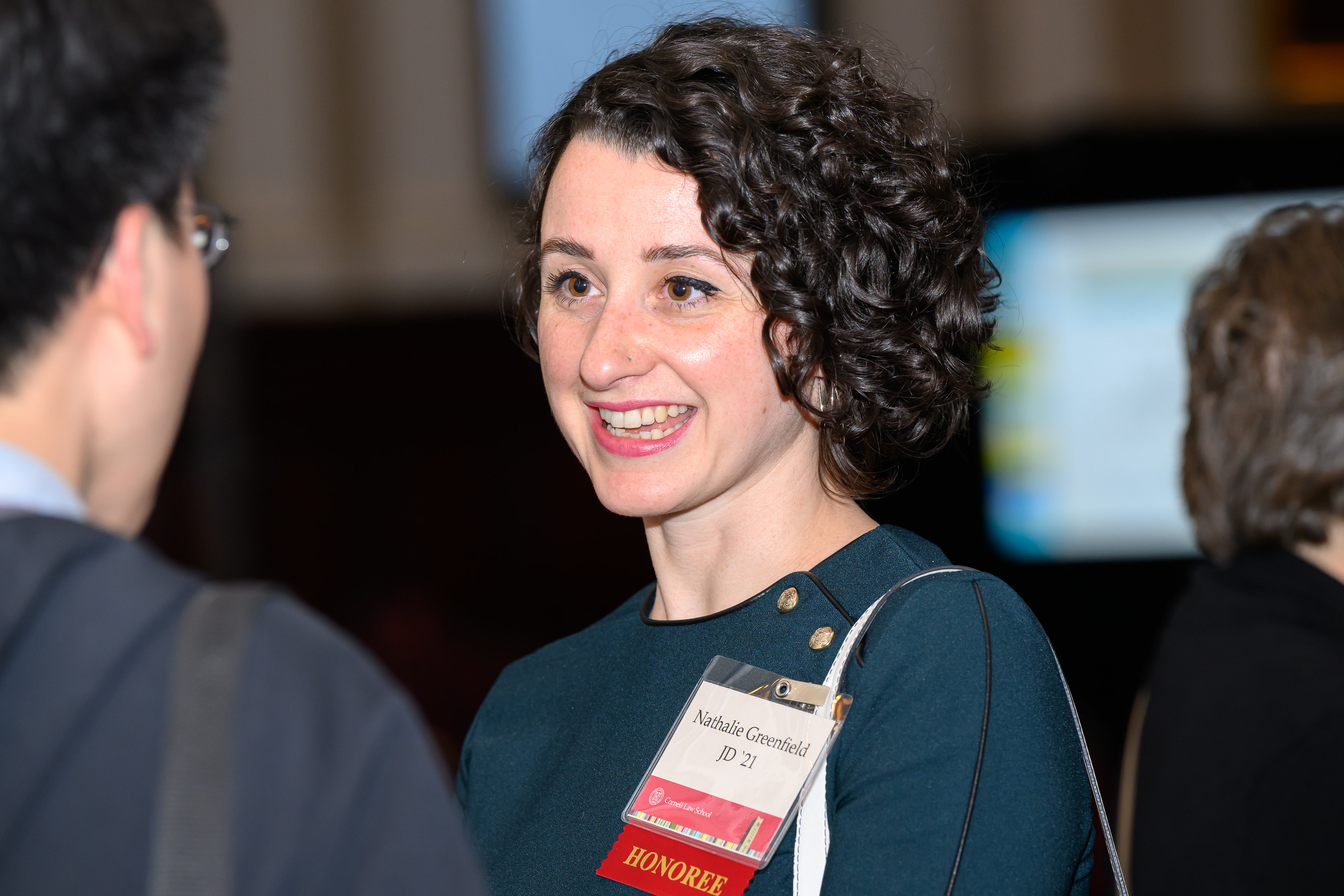
Rising Star Award winner Nathalie Greenfield ’21
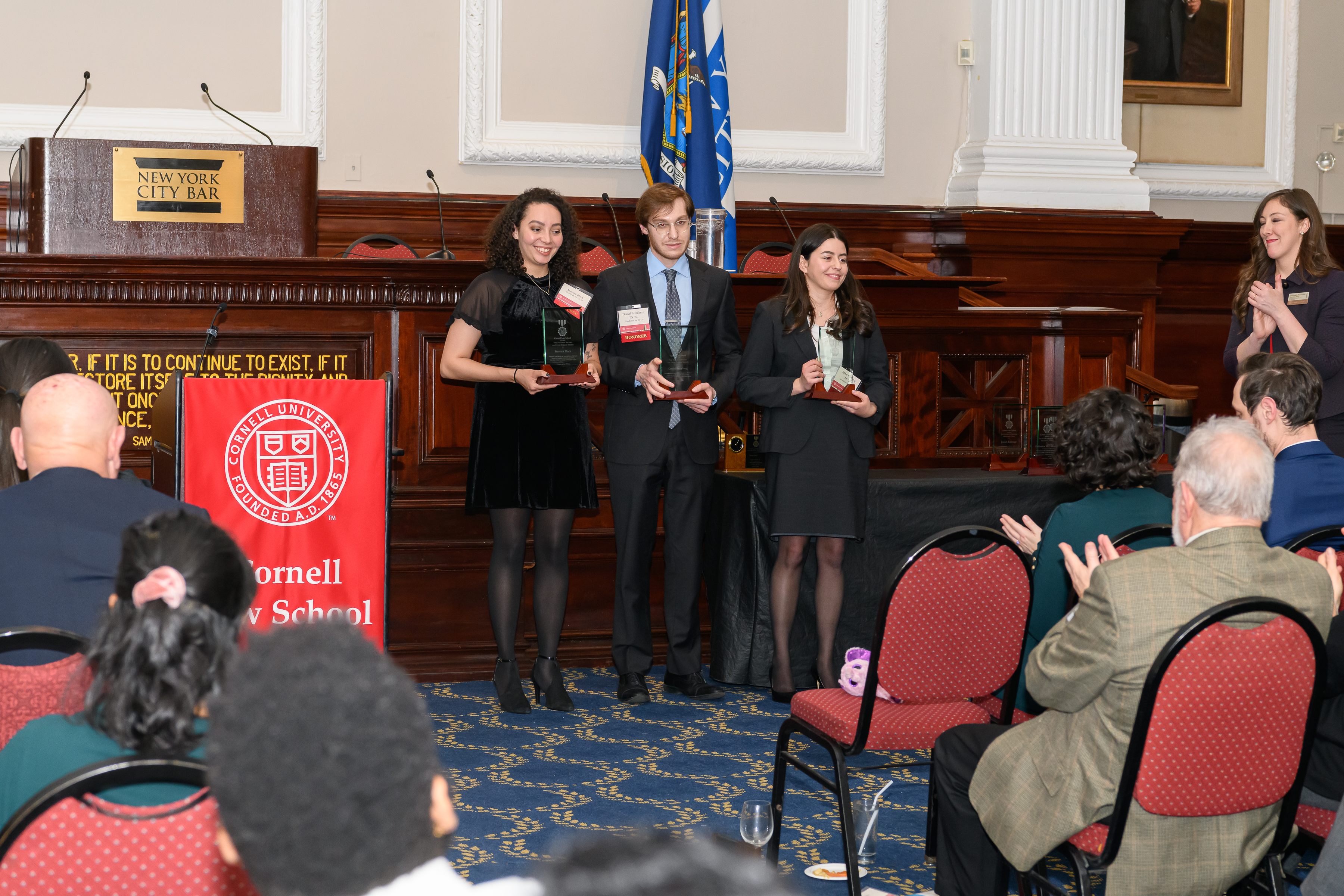
Winners of the Freeman Award for Civil-Human Rights (L to R): Merrick Black ’24, Daniel Bromberg ’24, and Mimi Goldberg ’24.
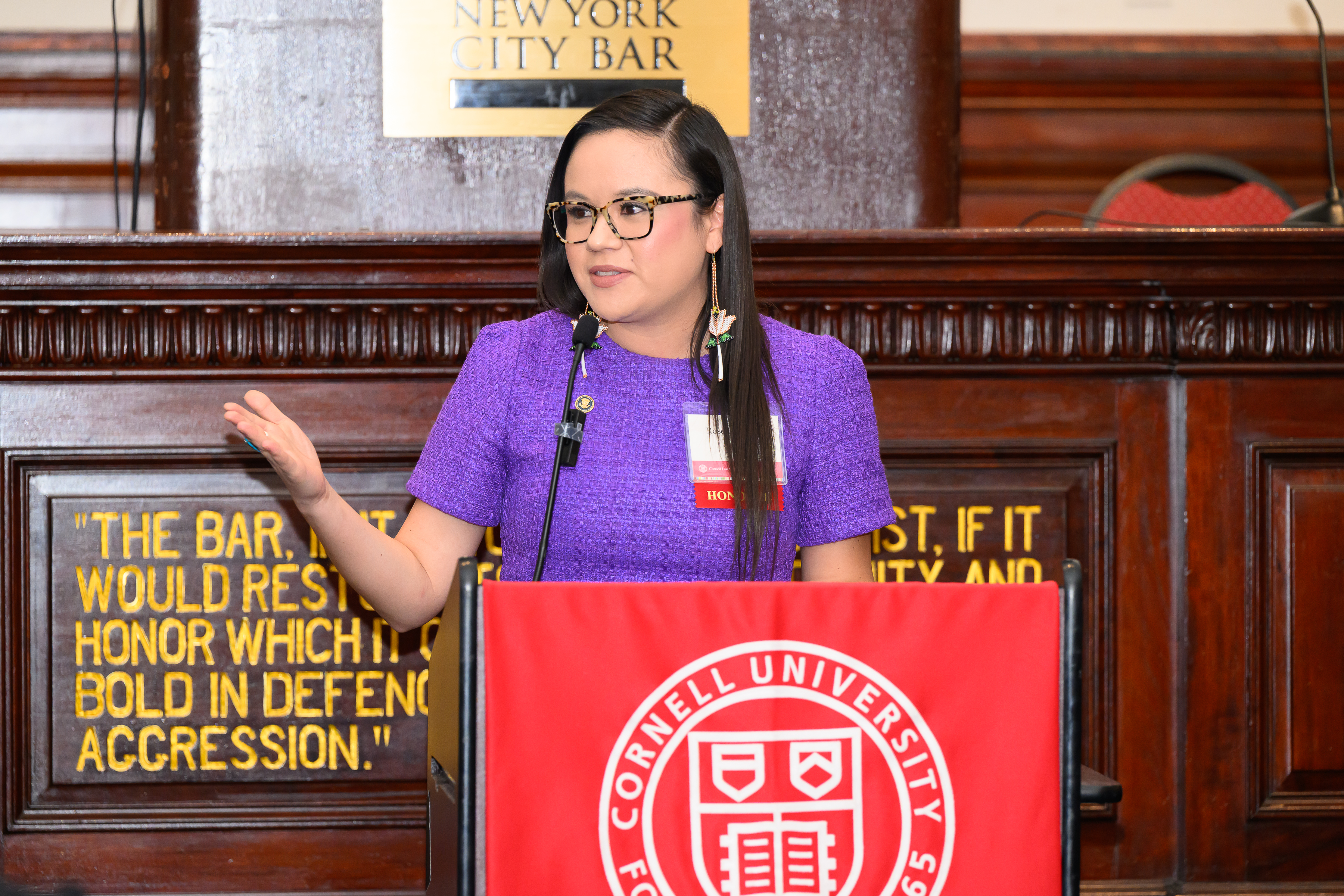
Rose Petoskey ’15
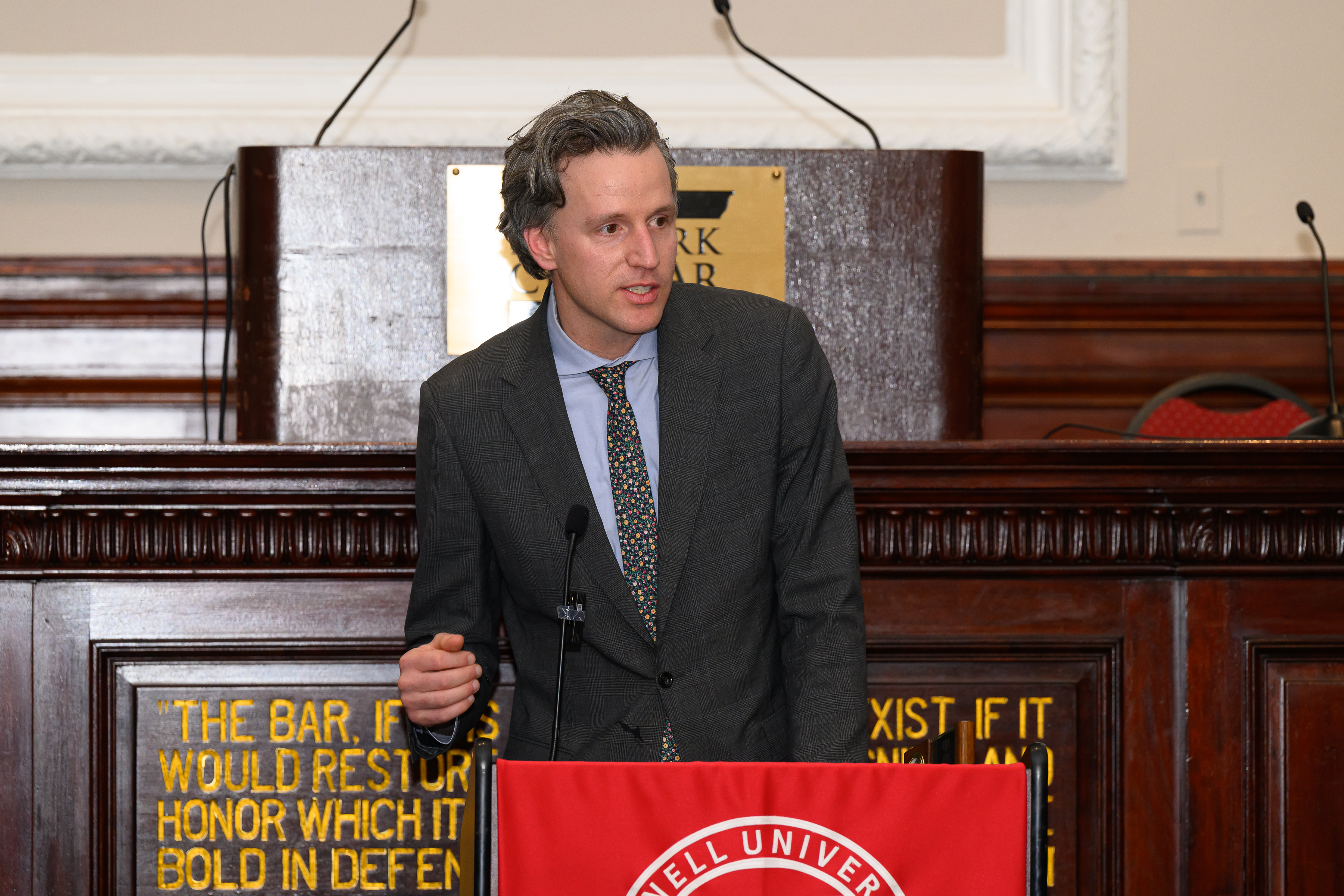
John Mills ’08
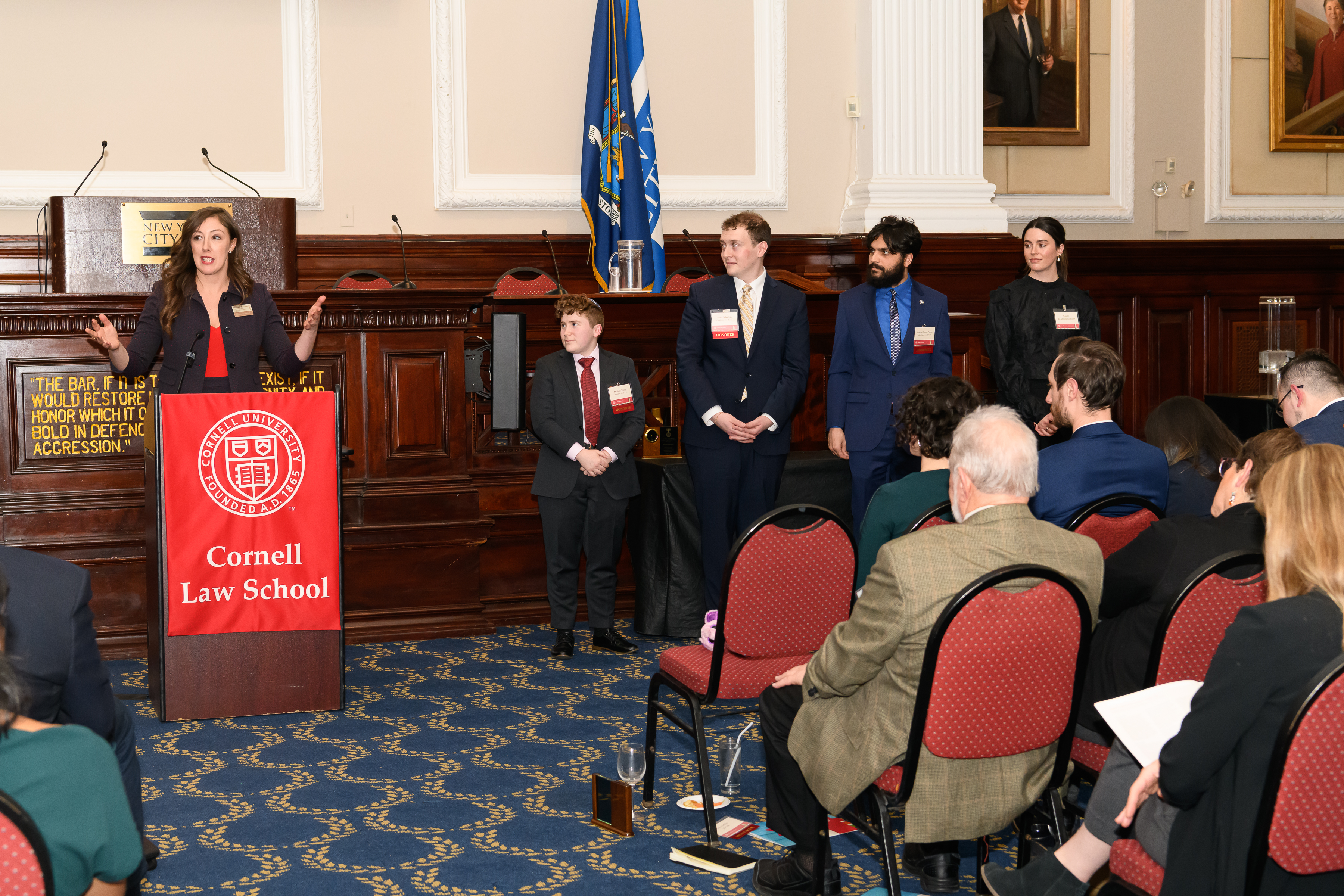
Michaela Azemi (at podium), the Law School’s director of public interest and community engagement, presents the Stanley E. Gould Prize for Public Interest Law to (L to R) Miriam Mars ’24, Isaac Belenky ’24, Pierre St. Perez ’24, and Konner Robison ’24, who was honored posthumously, and whose award was accepted by his widow Claire.
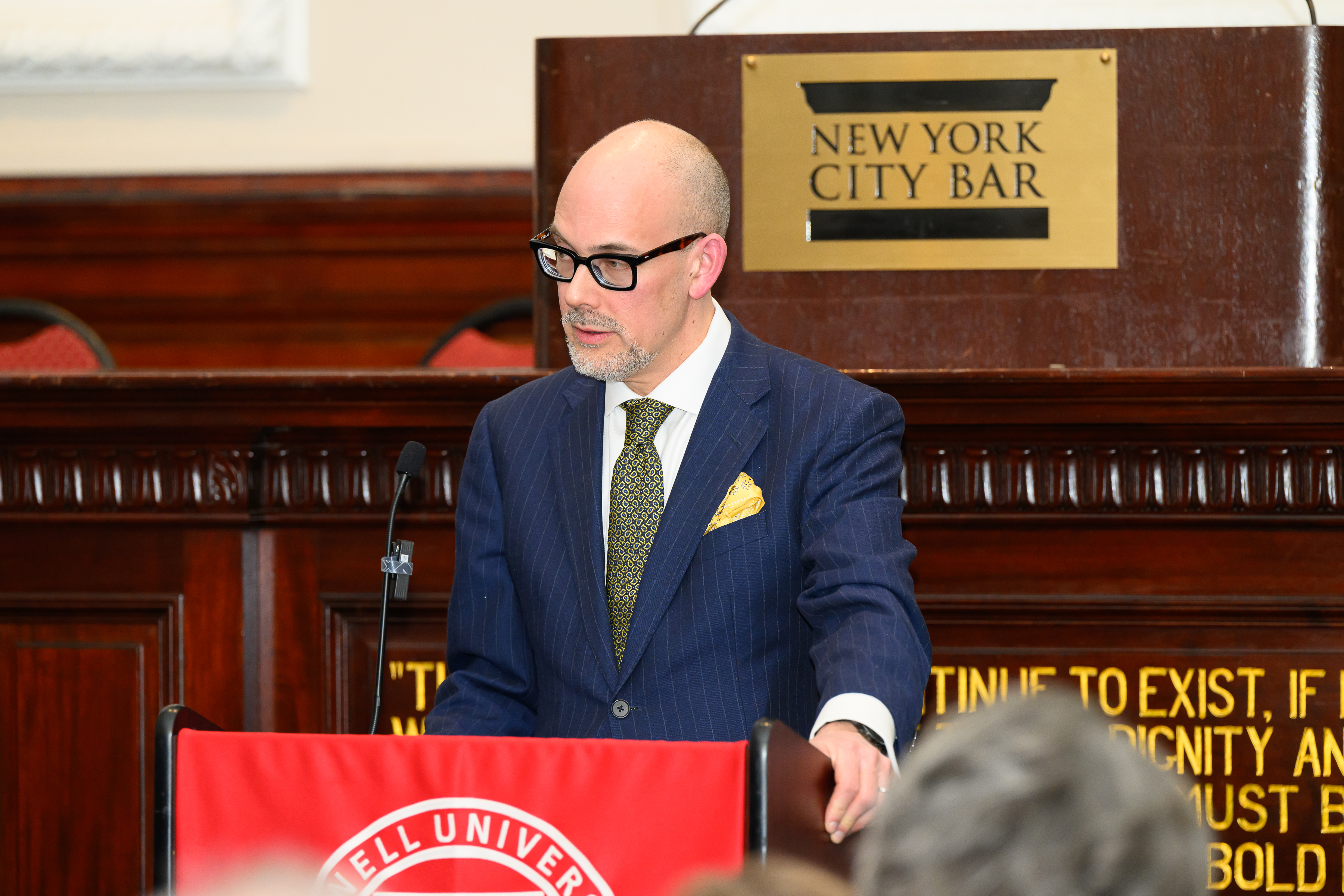
Jens David Ohlin, the Allan R. Tessler Dean and Professor of Law
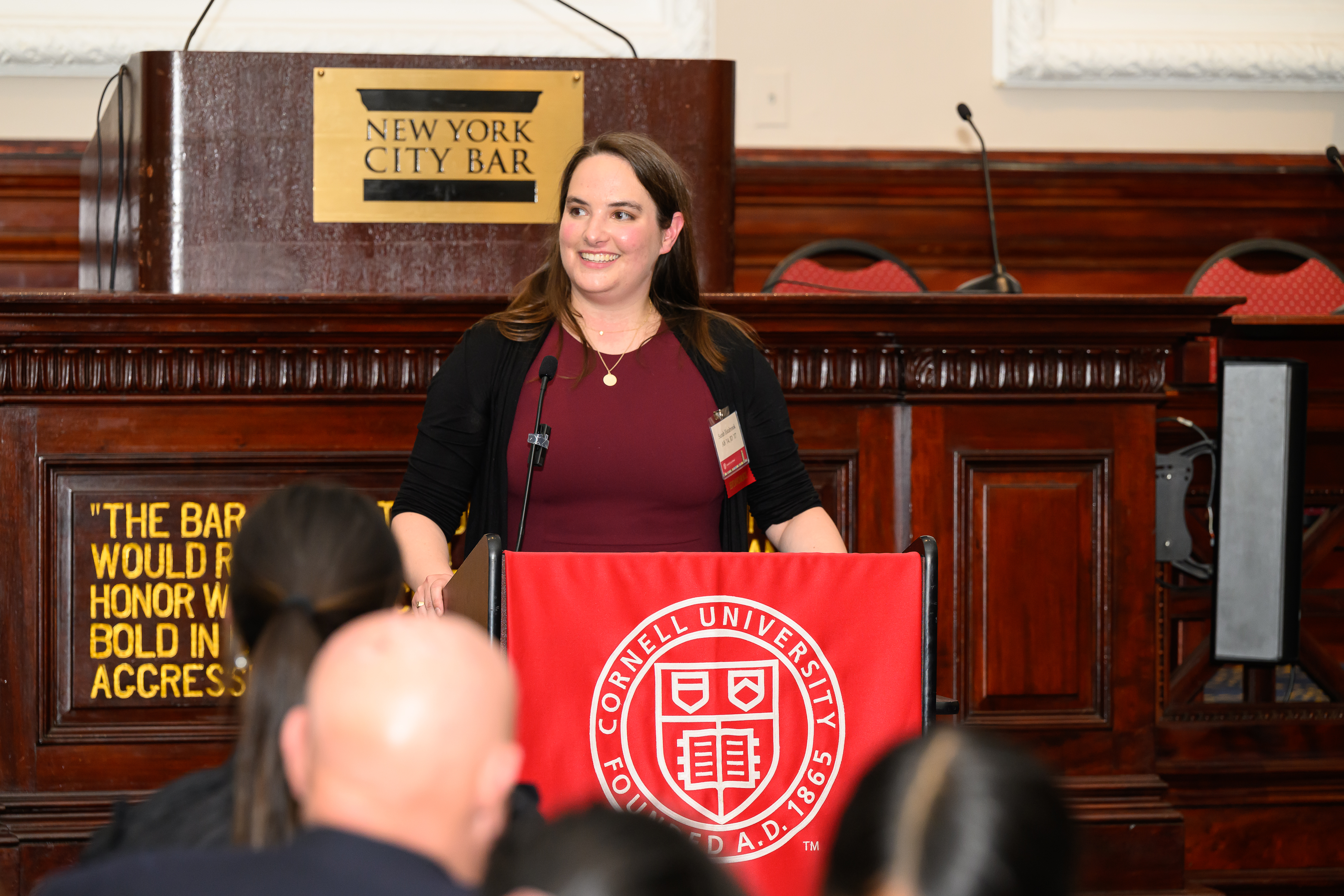
Azemi honored several third-year Law School students for their contributions to the public interest. The Freeman Award for Civil-Human Rights, which honors students who have made significant contributions to the public interest during their time at Cornell, went to Merrick Black, Daniel Bromberg, and Miri Goldberg.
The Stanley E. Gould Prize for Public Interest Law is presented to students who have shown outstanding dedication to serving public interest law and public interest groups. This year, the prize was given to Isaac Belenky ’24, Miriam Mars ’24, and Pierre St. Perez ’24, and to Konner Robison, who was honored posthumously after he tragically passed away in November, and whose award was accepted by his widow Claire.
Azemi recalled Robison’s leadership as a “cornerstone of public interest at Cornell Law School,” and his work with her and with other members of the Cornell Law Veterans Association to launch the Veterans Law Practicum last fall. “But for Connor’s dedication and brilliance,” Azemi said, “this new clinic wouldn’t exist.”
The Seymour Herzog Memorial Prize, which is awarded to students who demonstrate excellence in the law and commitment to public interest law, combined with a love of sports, went to Katherine McCullough, Sawyer Nash, and Josiah Rutledge.
During her remarks, Petoskey mentioned a time during her 1L year when she was struggling and went to Professor Faust Rossi for help. “He told me, ‘You know, you’re going to make it,’” she said.
“And so, to the law students in the room: You’re going to make it, and you’re going to do great things.”